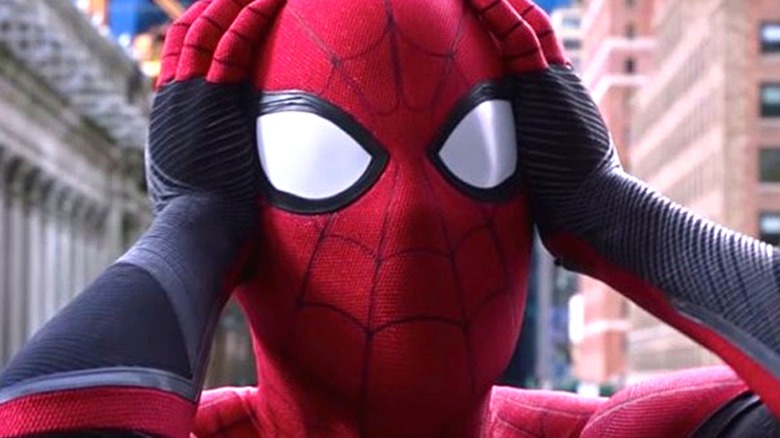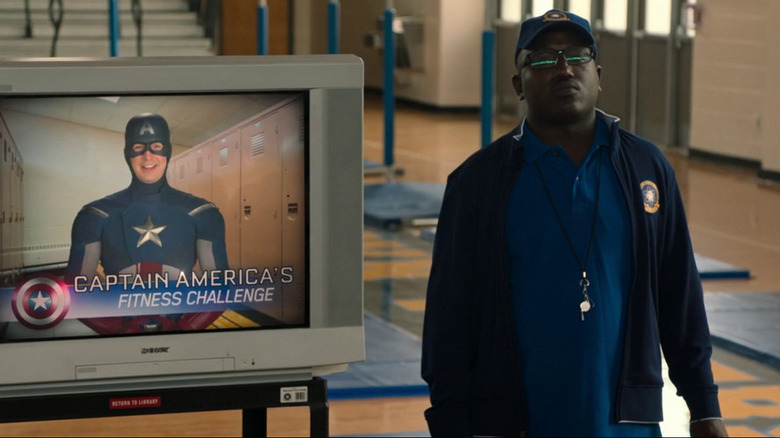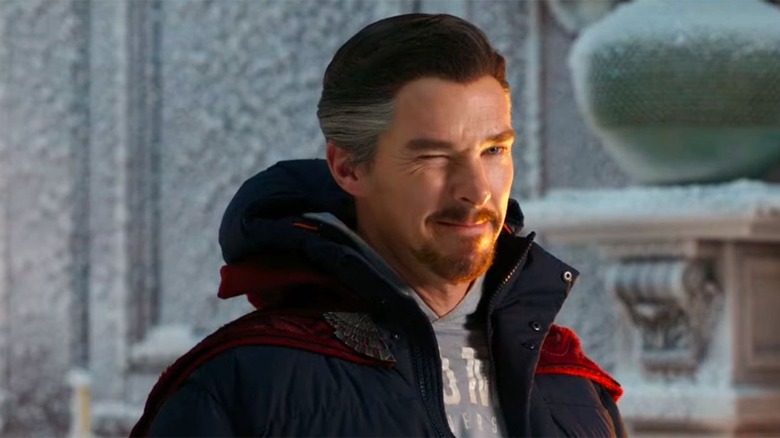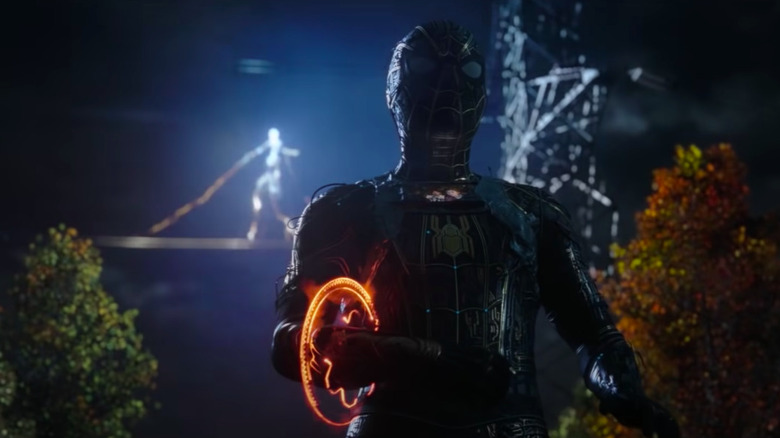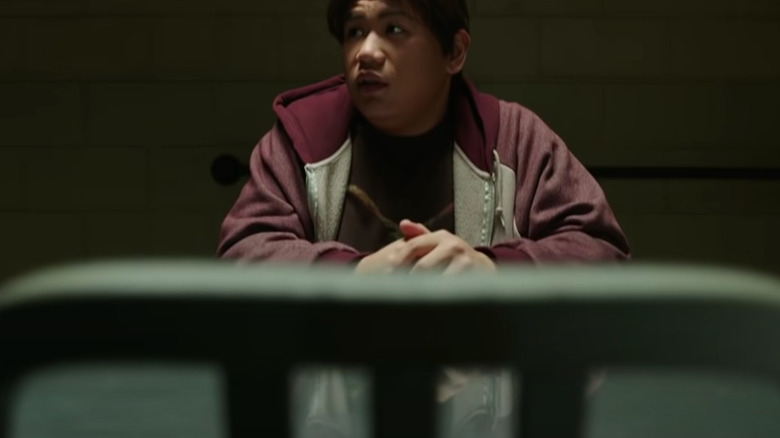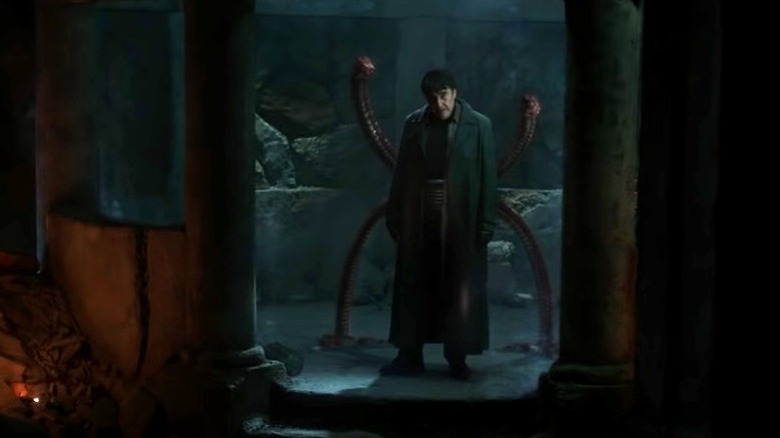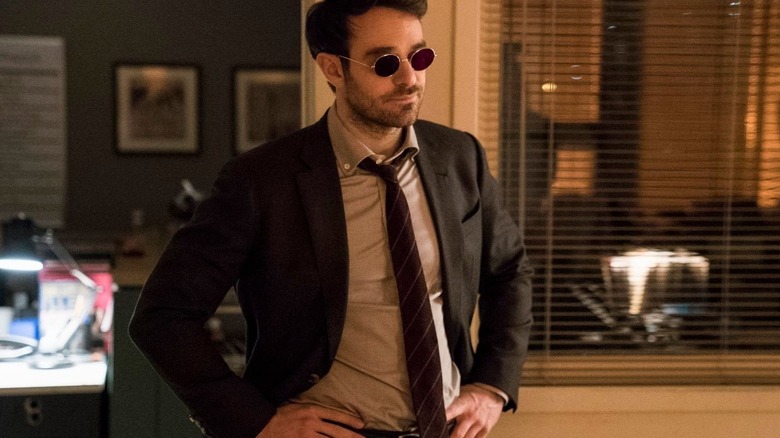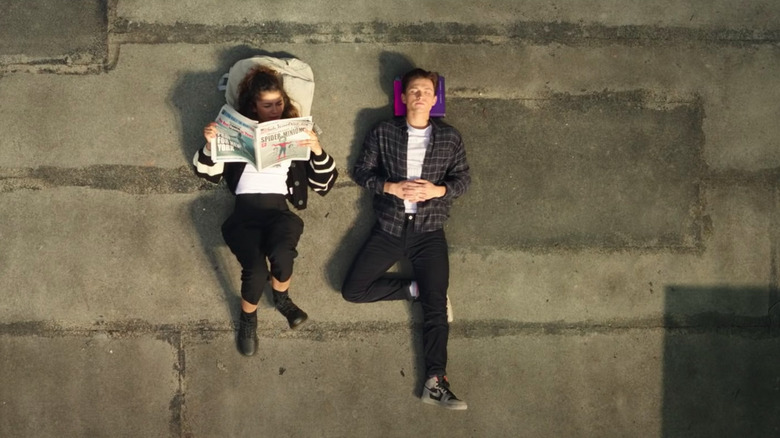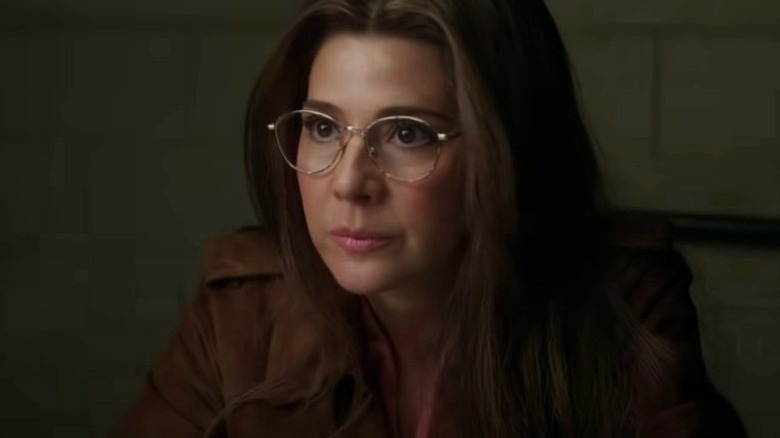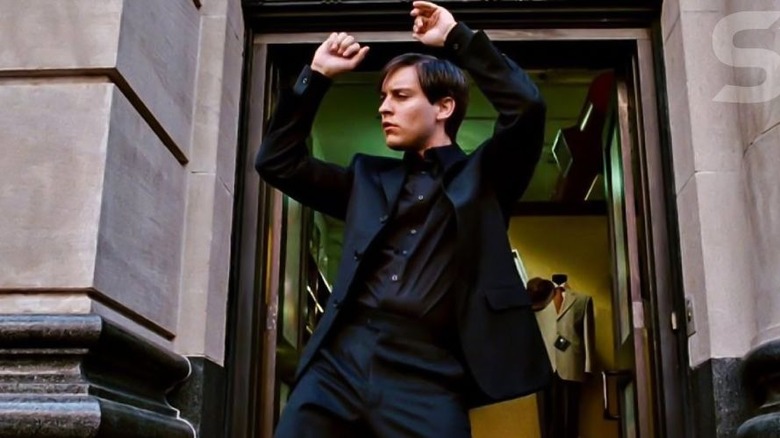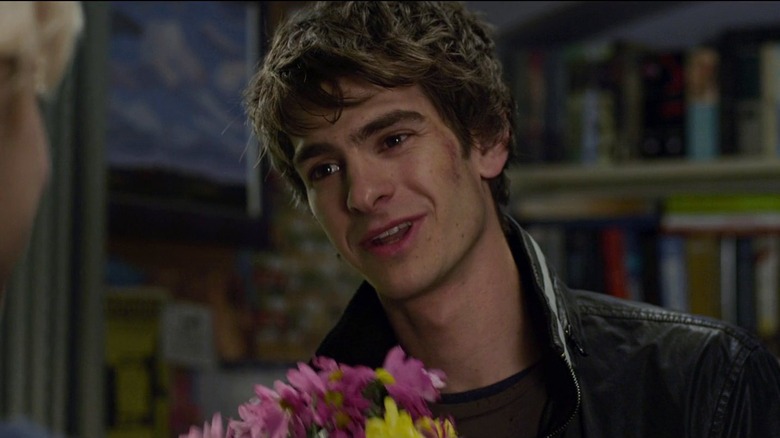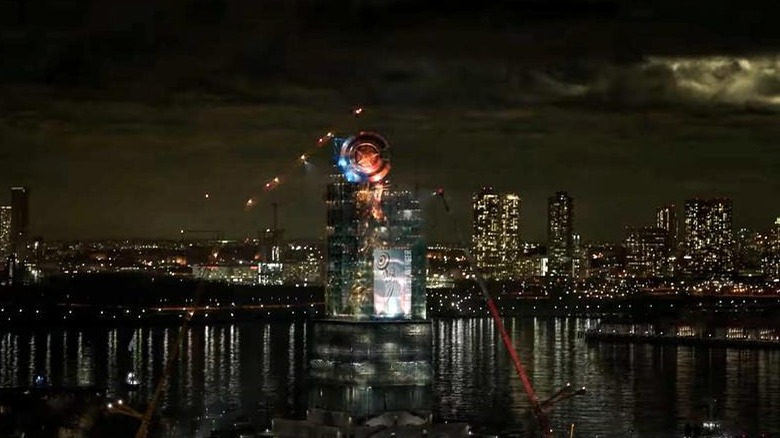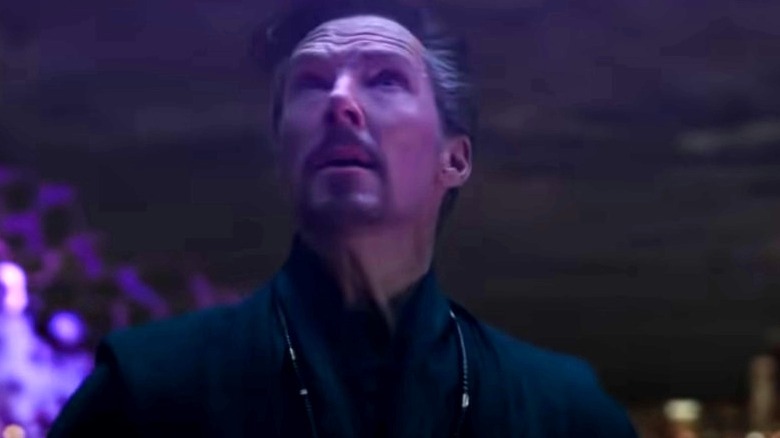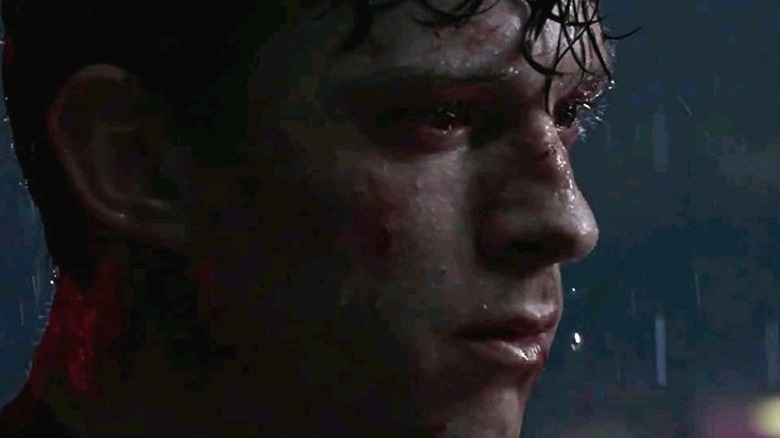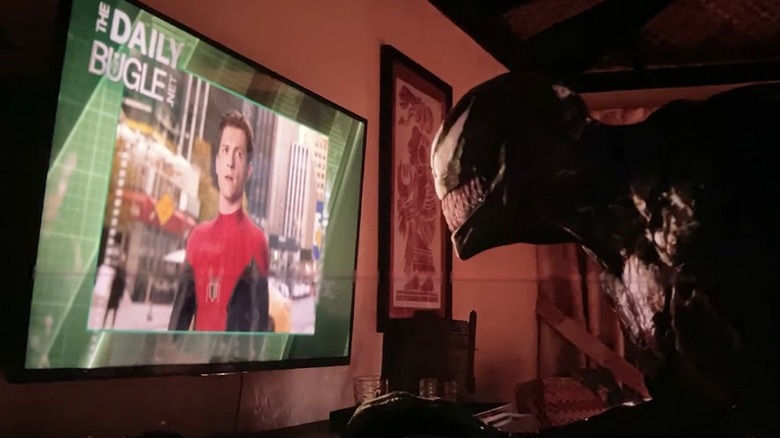The 8 Best And 6 Worst Things About Spider-Man No Way Home
If you have not yet seen "Spider-Man: No Way Home" and are still avoiding spoilers, leave now if you don't want to know what happens in the Marvel Cinematic Universe's biggest event of 2021. The good folks at Columbia Pictures and the House of Mouse really saw your "most ambitious crossover event" memes about "Avengers: Endgame" and raised you two sets of previous Sony Spider-Man franchises. There's a lot to love in this movie, a handful of things to roll your eyes over, and more than a few head-scratchers. For the most part, Tom Holland and friends knocked it out of the park, but here's what did and did not work in "Spider-Man: No Way Home."
Once again, this is your final spoiler warning. I'm going more or less chronologically through the film, so the further you scroll, the worse the spoilers will get. Can I make it any more obvious? There will be spoilers about the things you thought were going to happen that did happen. There will be spoilers about things that you thought were going to happen that didn't happen. There will be spoilers about the ending. There will be spoilers about the post-credits teases. If you don't want to be spoiled, beat it!
Best: Coach Wilson is a Mysterio truther
Let's start with something that's relatively low stakes but still great. At the beginning of "Spider-Man: No Way Home," Peter Parker returns to school for his senior year having been branded as a killer. While many still regard him as a hero, there are plenty who "believe Mysterio" and see him as a murderous vigilante.
The latter group includes Hannibal Burress' Coach Wilson, who returns after appearing in "Spider-Man: Homecoming." In that film, he makes a remark referencing the events of "Captain America: Civil War" about how he's "pretty sure" that Steve Rogers is "a war criminal." So, it makes sense that, especially after the blip, this guy would have opinions about the Avengers. There has to be somebody at the school who doesn't trust Peter, and Wilson is a hilarious choice.
Did you notice in that scene that Hank Pym has been added to the mural of scientists (which already included Howard Stark) who attended Midtown High? One of this trilogy's strengths is its supporting cast and the way it creates a believable high school set in this fantastical world. I only wish we'd gotten a little more!
Worst: Doctor Strange is bad at both magic and being a role model
In "Spider-Man: No Way Home," we learn that Wong was named Sorcerer Supreme during the Blip, which helps explain why he was being such a boss in "Shang-Chi and the Legend of the Ten Rings." Thank goodness, because Doctor Strange is more irresponsible than ever. He even blames Peter for his mistakes, which is pretty unfair.
Tom Holland's Peter Parker has had his fair share of bad role models. It's clear that he's a good kid because of Aunt May, but other male characters have tried to be father figures to him, with varying degrees of success. Tony Stark gave him — dare I say the thing? — way too much responsibility at a young age. So did Nick Fury. Mysterio turned out to be a villain. But "No Way Home" makes it clearer than ever that Strange is a pale imitation of Stark, because when the wizard embraces Peter's terrible idea to cast a spell on the entire world, he's unable to get his Avengers teammate out of trouble.
Say what you will about how a Peter Parker funded by Stark Industries removes the character from his blue-collar roots, but at least Tony didn't let anything bad happen to the kid, and ultimately sacrificed himself to keep it that way ... on Doctor Strange's advice, I might add. Thankfully, Peter had some other, better role models in "No Way Home.
Best: Hans Zimmer's Electro theme
Bringing together the villains from three "Spider-Man" franchises didn't just mean calling up veteran Marvel actors and weaving plot threads from five different films into the new trilogy. It also meant dropping little ghosts of the scores from the past into the film, including the dubstep Electro theme composed by Hans Zimmer, the Magnificent Six, Pharrell Williams, and Johnny Marr. It's a bizarrely delightful nostalgia blast early on in the movie, and it kind of slaps. Even if you didn't like the villains of the "Amazing Spider-Man" franchise, something that "No Way Home" has a lot of fun with, you can't deny that they went hard.
That said, many aspects of Jamie Foxx's campy "Amazing Spider-Man 2" villain did not make the transition into "No Way Home." His combover, tooth-gap, stutter, and glasses are gone. He's not even really all that blue. He's clearly the same character, but Foxx toned down his performance considerably. The only thing not toned down is that theme.
Worst: Hinting at Ned becoming a villain
When dear, sweet Ned Leeds learns that some Spider-Man villains started out as FOS ("friends of Spider-Man"), he promises that he'll never betray Peter and turn evil. This gave me the biggest lump in my throat, because that's exactly what happens in the comics. Well, it's sort of what happens. Ned is one of many characters who becomes a villain known as Hobgoblin. He's technically brainwashed, so it wasn't his choice to break bad, but still. Don't even joke about that, Ned. Not cool!
Ned becoming Hobgoblin was actually one of the many rumors surrounding "No Way Home," although it didn't turn out to be true — at least, not yet. What was going on with Ned's magical proclivity? Are they hinting at a villainous future for Ned, even given the way this film ends? I really hope not. That would be heartbreaking. The MCU's version of Ned Leeds shares some qualities with the Marvel comics character, but he also borrows quite a bit from Miles Morales' BFF Ganke Lee, who has never done anything wrong in his life. Let's hope that Ned stays on that straight and narrow.
Best: The way the villains split into franchise-specific cliques
There's a lot to love about Alfred Molina and Willem Dafoe reprising their roles as Doctor Octopus and Green Goblin, respectively. Same goes for the returns of Jamie Foxx, Rhys Ifans, and Thomas Haden Church. The big crossover allowed us to see Tom Holland's Peter Parker fighting some of the most famous "Spider-Man" villains, played by actors whose names are synonymous with the characters. (The exception, of course, is Kathryn Hahn as Doc Ock in "Spider-Man: Into the Spider-Verse"; however, having Hahn reprise that role in a live action capacity after "WandaVision" and "Agatha: House of Harkness" might actually break the multiverse for good.)
But what I actually really liked about having all of these villains in the room together was the acknowledgement that some of them know and even care about each other. Electro didn't fully trust the Raimi trilogy villains, especially when separated from the Lizard. We learn that some of them mourned the others' deaths. It was a nice, casual bit of worldbuilding in a film that carried the weight of three different cinematic universes. Every time that I think that one of these Marvel Cinematic Universe crossover events is going to get too bogged down, the studio makes it work through the smaller moments.
Worst: Not enough Matt Murdock
While Charlie Cox's cameo as Daredevil, which officially folds Netflix's street-level heroes into the MCU proper, was glorious, it was too freakin' brief. Just one scene? That's all we get? Not even a single courtroom monologue? I understand that we had bigger and better cameos to get to, but his appearance really does "yadda yadda" away the movie's early conflicts pretty quickly. A "deus ex Matt," if you will.
I don't want to walk out of Marvel movies more excited for the next thing than the thing I just watched. That's a valid criticism of this type of highly interconnected, serialized storytelling. Yet, here I am, days after watching "Spider-Man: No Way Home," wondering when it's going to be confirmed that Charlie Cox has joined the cast of "She-Hulk" or "Echo." I love it, but I also hate it. Does that make sense?
Also — and I hope everyone who watched "Daredevil" agrees with me — it's incredibly unbelievable that Matt Murdock didn't flirt with Aunt May. I know that it's kind of played out for characters to swoon over Marissa Tomei in these movies, but the man is an incorrigible gallant.
Best: Nobody is kidnapped or held hostage
Something I really dislike about the Spider-Man movies, especially the Raimi trilogy, is how often the villains kidnap Peter Parker's love interests and family members in order to manipulate the friendly neighborhood hero. (This is not a problem exclusive to Spider-Man, obviously, but it's glaring when you marathon all the movies in 2021.)
It's a real bummer, especially when you're a woman who is desperately trying to relate to those female characters, and then realize that the only place for you in this world is dangling off a building. So, when the return of these Raimi trilogy villains was announced, I was nervous. The Marvel Cinematic Universe has largely avoided the damsel in distress trope. Was I really about to see Zendaya's MJ threatened by the Green Goblin? Like, could we not?
So, while "Spider-Man: No Way Home" did dip its toes into some of my other least-favorite tropes, I consider it a win that nobody was kidnapped. MJ did fall off of a building, but that was an incredibly well-executed emotional moment, so I, the judge of what is and is not sexist for the remainder of this paragraph, will allow it.
Worst: Aunt May's death
As it turns out, I was a little bit right to be worried about what would happen if the Raimi characters were unleashed on the MCU's women. You could make the argument that Aunt May's death isn't an example of "fridging," or the killing of a female character to motivate a male character, because it is supposed to be a stand-in for Uncle Ben's murder in other iterations of Peters Parker's origin story. At least, I think that's the intention, because the Green Goblin tells Peter that he'll "thank him for it," thereby indicating that the Goblin is trying to motivate the young hero.
Still, I won't necessarily fault you for thinking otherwise. Tropes like this are more useful to examine on a macro scale rather than a case-by-case basis, anyway. Nobody thinks that female characters should be exempt from death. It's just that, once you start to notice trends, it becomes problematic.
But, fridging or not, the moment sucks! I hated to see Aunt May die. I hate to see Tom Holland cry. I don't like that Peter blames himself for her death when it's not his fault, not even a little bit. He was doing the right thing. So was she. Raising the stakes is great, but not like this.
Best: How much Tobey Maguire's Peter Parker matured off-screen
Sure, your theater probably freaked out when Tobey Maguire showed up on screen. It didn't really matter what happened next, even though what happened next was pretty incredible. The chemistry between the three Peters? Practically perfect. The group therapy sessions? Absolutely necessary.
What I really liked about Peter 2, aka Maguire's Peter, is how we can safely assume that he did a lot of growing up after the events of "Spider-Man 3." His portrayal of the character was never chill, but as an adult he exuded a calming kind of wisdom. He wasn't bitter like Jake Johnson's Peter B. Parker in "Into the Spider-Verse," either. He'd just kind of settled down. (If you haven't noticed, I'm not a huge fan of the Raimi trilogy. I'm not like other millennials!) He was supportive of his younger "brothers" in a way that I found really charming, and it made me feel safe in a way that I didn't expect.
Best: Andrew Garfield's genuine joy
What I really liked about Peter 3, aka Andrew Garfield's "amazing" Spider-Man, was the gleeful energy that the actor himself brought to the role, finally getting the closure both he and his character so desperately needed. He was so happy to be there, and I was so happy to see him. Even when Garfield's Peter wasn't actively participating in a scene, he was puttering around in the background and observing everything with a grin on his face. In the days following the release of the film, there has been a lot of praise for his performance. As a fan of Garfield's Peter Parker from the start, I guess you could say I'm feeling vindicated.
That said, he wasn't all sunshine. There was plenty of angst. When the second trailer for "No Way Home" showed MJ falling a la Gwen Stacy, fan theorists who didn't believe the lies about Garfield's non-involvement predicted that it would be his Peter who caught her, ultimately redeeming himself for Gwen's death. But I don't think anyone could have guessed that he would start crying with Zendaya's character still in his arms. It was a moment that took simple fan service to the next level.
Worst: Putting a Captain America shield on the Statue of Liberty
Sorry, but this was tacky. I would hate to be a New Yorker in the Marvel Cinematic Universe. Yes, the city gets attacked fairly often, but I would not want to deal with that corny eyesore, either. I cheered when the shield fell off of the scaffolding during the final battle. It looked silly.
I also have a ton of questions about the current state of public opinion surrounding Captain America and his legacy in the MCU, and didn't love having that be a distraction while I was trying to pay attention to a "Spider-Man" movie. You're telling me that in the span of about a year Steve Rogers disappeared, John Walker was named the new Captain America, Walker was subsequently caught on camera beheading someone with the shield, Sam Wilson took over as Cap, and New York City decided to add a Captain America shield to the Statue of Liberty right as "Rogers! The Musical" opened on Broadway?
Is everyone okay? Why are they so obsessed with Captain America? Are they all just spiraling over the loss of three founding Avengers?
Worst: All the questions I have about the spell at the end
At the end of "Spider-Man: No Way Home," Doctor Strange makes the entire world not only forget that Peter Parker is Spider-Man, but that Peter Parker exists in the first place. Peter promises Ned and MJ that he'll come find them, but chickens out and decides to give them some time to live their life outside of the superhero world. When he sees them at the coffee shop where MJ works, they don't recognize him. That all makes sense for about five seconds. Then, the magical logic starts to fall apart.
When Peter visits Aunt May's grave, Happy is there, and says that he knows May "through Spider-Man." Peter says that he does as well. So, what's that like for Happy, experience-wise? What exactly does he remember? Does he know that Tony Stark recruited a kid who goes by Spider-Man, and that they saved the world together, but he can't tell you Spidey's real name or pick Peter out of a line-up? Is Peter wearing a mask in all of Happy's memories, even the ones where he wasn't actually masked? How does Happy think May knew Spider-Man?
And that's just the beginning. If Happy remembers that he worked with Spider-Man, do Ned and MJ remember that they were friends with Spider-Man? Why is MJ still wearing her necklace? Does Peter still have a social security number? How'd he get an apartment without an identity? Not to be dramatic, but I need answers!
Best: The ending brings Peter Parker back to basics
The upside to this ending is that it makes the "Homecoming" trilogy a giant origin story for Tom Holland's friendly neighborhood Spider-Man. Now that Peter has to fend for himself in New York City, he's the scrappy blue-collar hero that fans fell in love with back in the day. He's back to making his own costume and solving small-scale crimes. He's not equipped with Stark Tech or heading into space. He's going to have to get a job, and balance his superhero duties with his personal responsibilities. Peter Parker may be older and wiser now, but he's the proverbial little guy once again.
This turn of events is also a refreshing twist on the concept of a superhero secret identity, something that the MCU has more or less eschewed from the start. Tony Stark declaring "I am Iron Man" set the precedent that, in this world, heroes don't hide who they are. I've never liked it when a superhero lies to his crush about his secret identity or breaks up with her to "protect" her. Relationships based on secrets are never a great idea, and I don't like it when people lie to me, so why would I want to watch characters I like and relate to be on the receiving end of similar fibs. But this was a nice little riff on the concept. It feels more grounded, and I have no doubt that things will work out in the end.
Best: What this implies about Eddie Brock
For my last trick, allow me to don my tinfoil hat. Doctor Strange's spell summoned both heroes and villains from other universes who "know Peter Parker is Spider-Man." We learn in the post-credits scene that Tom Hardy's Eddie Brock and Venom are one (or two, really) of those characters, but that they spent the duration of the film getting drunk at a bar rather than terrorizing New York City. Though they don't call this group of villains the Sinister Six, there are indeed six of them if you count Venom along with Doctor Octopus, Green Goblin, the Lizard, Electro, and Sandman.
This could mean that, in the Venom universe, Eddie Brock knows that Peter Parker is Spider-Man and has done nothing with this information. I'm not saying I'm surprised. He is an investigative journalist, after all. We don't know which Peter Parker is his (please be Andrew Garfield, please be Andrew Garfield) or how he discovered his secret identity, but the cards are on the table now. It's very funny and in-character that Eddie would know this potentially Earth-shattering piece of information and simply not care (it's also possible that Venom knows, but Eddie doesn't, which might make more sense but is a whole lot less fun).
